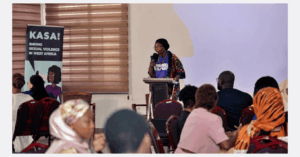Collective Action Against Sexual Violence: KASA! Initiative Partners’ Covening in Northern Ghana

Tamale, 26 March 2025: In Ghana, like many other countries, sexual violence remains a particularly prevailing and complex issue often shrouded in silence. Nearly one in four women in Ghana between the ages of 15 and 49 experience some form of violence during their lifetime.
To support the ongoing efforts to address sexual violence, the African Women’s Development Fund (AWDF) under its KASA! Initiative and in partnership with Savannah Women Integrated Development Agency (SWIDA) under the powerful theme “Dreaming, Speaking Out, and Acting Collectively Towards a World Free of Sexual Violence” gathered grantees, partners, and advocates for a transformative convening at the Modern City Hotel. The event, held on Wednesday, March 26, 2025, brought together voices from civil society, government, traditional leadership, and digital activism to strategise on ending sexual violence in communities across Ghana and beyond.
The convening emphasised three critical priorities: the need for collective action, amplifying survivor voices, and strengthening institutional responses to sexual violence.
Setting the tone of the convening, Hajia Alima Sagito-Saeed, the Executive Director of SWIDA emphasised the need for unified efforts to dismantle systems that perpetuate sexual violence.
“This convening is not just about dialogue; it is about action. We must dream boldly, speak unapologetically, and act decisively to protect women’s rights,” she stated.
She highlighted SWIDA’s grassroots initiatives, including community education programs and survivor support networks, which empower women to break the silence around sexual violence.
In her opening remarks, Gifty Ayebea Adem, AWDF Programme Officer highlighted the initiative’s work in empowering survivors and strengthening community-led responses to sexual violence.
“Sexual Violence continues to rob lives, dreams and dignity across societies and we cannot continue to watch on. We recognize that sexual violence is shrouded in silence often due to social, cultural and religious norm practices. This impedes prevention and response,” stated Gifty Ayebea Adem.
Stressing the importance of grassroots mobilisation, Gifty highlighted: “When women and girls are safe, our communities thrive. KASA is committed to ensuring that no survivor stands alone. We also hope to foster stronger partnership among us and to see inspiring post-convening interventions.”
KASA, which means “speak out,” was launched by AWDF with the Ford Foundation and Open Society West Africa with a seed fund of $3,750,000.00 to support sexual violence interventions in Africa. The KASA initiative has supported 45 organisations in Ghana, Senegal and Nigeria, implementing various interventions to combat sexual violence.
Hajia Alhassan Bushira, representing the Ministry of Gender, Children, and Social Protection, commended the organizers and reinforced the government’s role in policy implementation and legal frameworks. She underscored the importance of engaging men and boys in prevention efforts: “We have to engage the male groups, because sometimes they feel they have the right to abuse women, and they say this out of ignorance so when you engage them at the community level, I think we will be making a headway.”
Traditional leaders, particularly in Northern Ghana, play a vital role in challenging harmful cultural practices. Queen Mother Bridgetwurche Barichisu Mankir reiterated the critical role of traditional leaders in addressing sexual violence. “Culture should not be an excuse for abuse,” she asserted. She shared how queen mothers in Northern Ghana are working to end harmful practices such as child marriage and advocate for survivor-centered justice.
Beyond the physical spaces, the digital landscape offers both opportunities and challenges in combating sexual violence. Social media influencer Addy Kehinde Hussanat explained how online platforms can amplify survivor voices while calling for stronger protections against online gender-based violence. She noted: “By sharing stories, we challenge victim-blaming narratives and hold perpetrators accountable.”
Hussanat also acknowledged the risks of online harassment and called for stronger protections for women who speak out. “We need tech companies and policymakers to take online gender-based violence as seriously as physical violence.”
The highlight of the program was during the two-part panel discussions where panelists demanded policy reforms and traditional leader engagement to combat impunity for perpetrators.
The panelists agreed that ending sexual violence requires a multi-stakeholder approach. Key recommendations included:
- Ensuring laws against sexual violence are enforced with accessible justice for survivors
- Engaging men, boys, religious and traditional leaders as allies in prevention
- Promoting women’s financial independence to reduce vulnerability to abuse
- Leveraging digital platforms for awareness while combating online harassment
- Expanding psychological support services for survivors
AWDF reaffirmed the organisation’s commitment to funding women-led and feminist movements across the continent and prioritising their leadership as they drive the most impactful change.
This article is written by Ewurama Attoh, a journalist based in Ghana.
